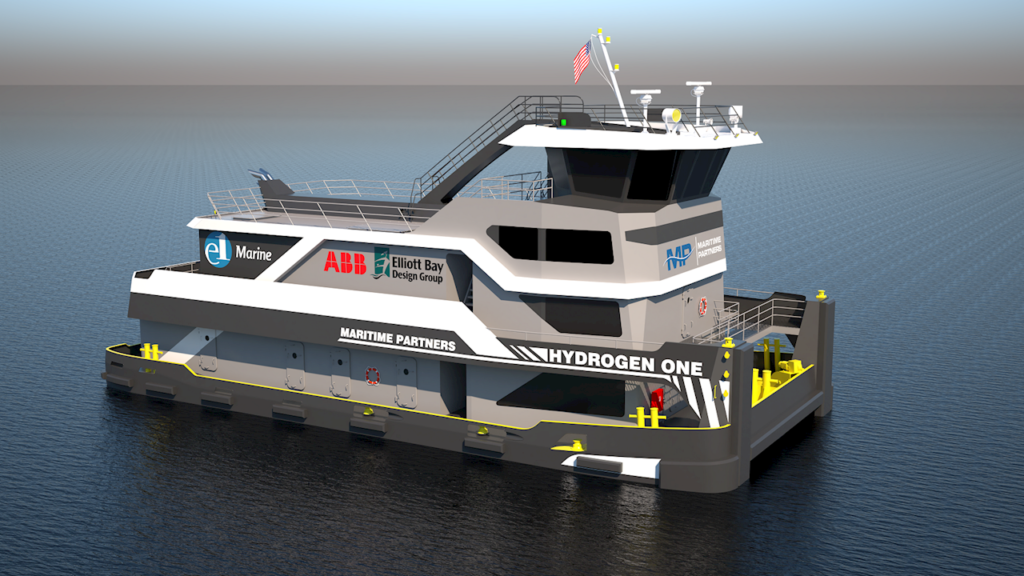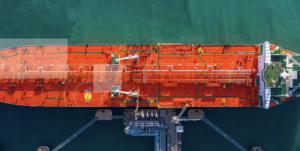ABB develops world’s first hydrogen powered towboat

ABB Marine & Ports has signed a Memorandum of Understanding with Maritime Partners LLC (MP), Elliott Bay Design Group (EBDG) and e1 Marine to develop a hydrogen-powered inland towboat for operation in the U.S.
The 27-meter towboat, Hydrogen One, designed to push barges along inland waterways, is intended for use on the 14,500-mile waterway network that extends from the Port of New Orleans, operating along the Mississippi River and its many tributaries.
The towboat will convert methanol to hydrogen directly on board, utilising a hydrogen generator by e1 Marine, which convert a mixture of methanol and water into fuel-cell grade high-purity hydrogen. Hydrogen generated by this process will then be fed into the fuel cells to generate electricity.
It’s said that onboard hydrogen production will eliminate complexities typically associated with direct fueling and storage of hydrogen. This approach results in no particulate matter emissions and less than 80 per cent Co2 emissions compared to an electrolyser solution using electrical power derived from fossil fuel sources. If methanol comes from a renewable energy source, the energy chain can also be carbon-neutral.
Hydrogen One is expected be able to travel with a full load for about four days at the speed of six miles per hour, covering approximately 550 miles before the need to refuel. According to the ABB, the vessel’s propulsion system will be capable of generating up to 2,700 HP propulsion power, with 1,700 HP generated by fuel cells and the remaining 1,000 provided by the battery. The vessel will be operated by Maritime Partners, a New Orleans-based owner of close to 550 towboats, barges and other maritime assets.
Having pioneered the development of integrated power systems for a variety of ship types and marine fuels, ABB will provide the full electrical propulsion plant for the vessel, including electric motors, transformers, as well as the integration of fuel cells and batteries. ABB says its award-winning Onboard DC Grid™ power distribution system will ensure that the fuel cell and battery output is delivered to the towboat’s subsystems in the most optimal way. The overall power setup will be controlled by ABB’s Power and Energy Management System (PEMS™), which will also increase fault tolerance and provide a high degree of reliability while ensuring the maximum lifetime for the batteries.
“As a leading provider, lessor and financier of towboats, tank barges and other workboats, we see this groundbreaking project as a major opportunity to advance sustainability in workboat operations in the U.S. and beyond,” says Austin Sperry, COO of Maritime Partners. “For fuel cell deployment along one of the most extensive inland waterway networks in the world, commitment from a partner overseeing 550 towboats is an excellent place to start.”
Fuel cells turn the chemical energy from hydrogen into electricity through an electrochemical reaction. Fuel cell technology is widely considered as one of the most promising solutions for supporting the shipping industry’s decarbonisation agenda and meeting International Maritime Organisation’s targets to reduce annual emissions by 30 per cent by 2025.
“We can make a real difference to efficiency and sustainability in the workboat sector, and have a transformative impact on air quality given that these vessels often operate close to centres of population. With this technology, we can offer U.S. shipyards, as well as state and federal agencies, significant support on their journey towards more sustainable operations,” says David Lee, senior account manager, commercial vessels, ABB Marine & Ports.
New Orleans-based leasing company, Maritime Partners, is a developer of alternative marine fuels for workboats, while Elliott Bay Design Group is a leading firm of naval architects and marine engineers and e1 Marine is specialised in hydrogen generation.










